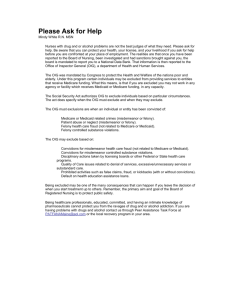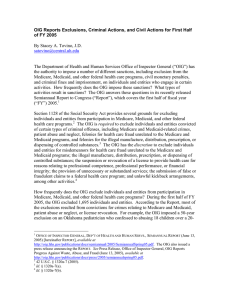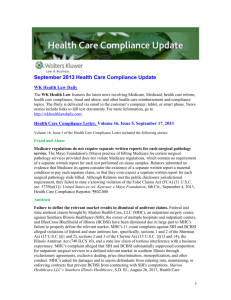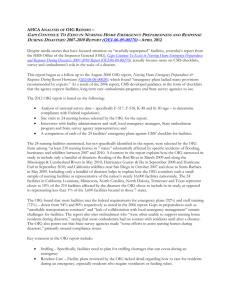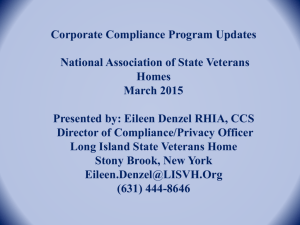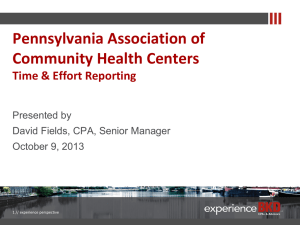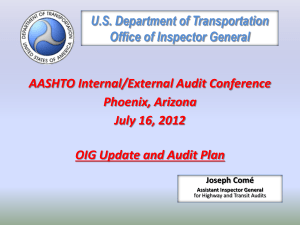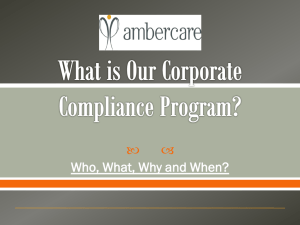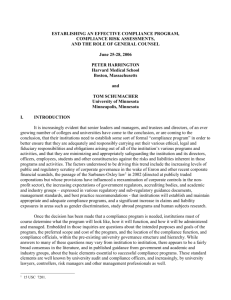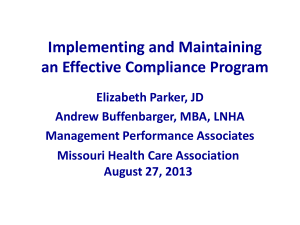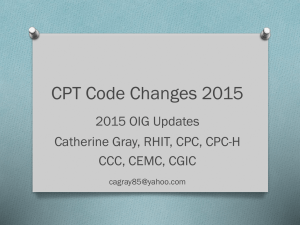NASVH Corporate Compliance Program Essentials
advertisement
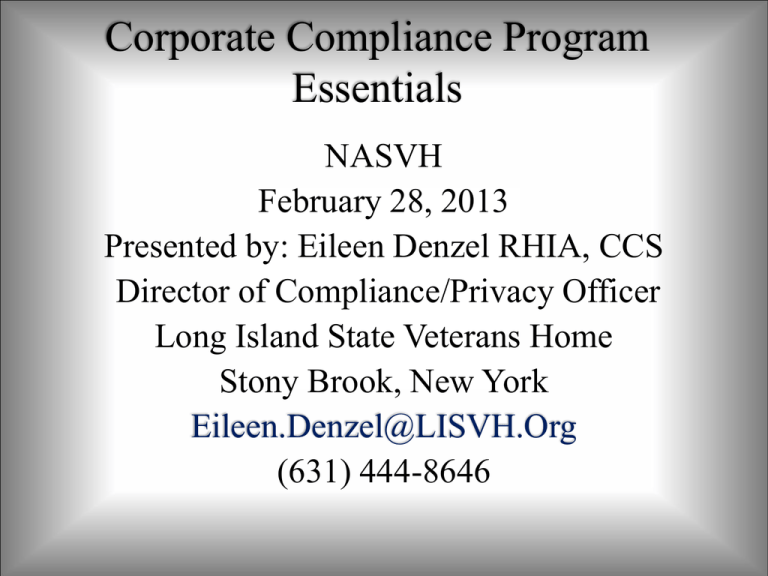
Corporate Compliance Program Essentials NASVH February 28, 2013 Presented by: Eileen Denzel RHIA, CCS Director of Compliance/Privacy Officer Long Island State Veterans Home Stony Brook, New York Eileen.Denzel@LISVH.Org (631) 444-8646 Presentation Outline • • • • • • • • • Why Have a Compliance Program? Affordable Care Act Compliance Program Mandate for 2013 Elements of a Compliance Program Required Policy & Procedures Risk Areas Resources and Educational Websites Sanction Screening Measuring Effectiveness Compliance Week May 2013 Why Have a Compliance Program? It is a demonstration to employees and the community at large of the Facility’s commitment to responsible corporate conduct; It improves our reputation for integrity and quality, increasing in market competitiveness and reputation in the community; It helps obtain an assessment of employee and contractor behavior; It helps increase the likelihood of identifying and preventing unlawful and unethical behavior; It allows a facility to quickly react to employees’ operational compliance concerns and effectively target resources to address those concerns; It helps improve the quality, efficiency and consistency of services; Why Have a Compliance Program? It encourages employees to report potential problems and allow for appropriate internal inquiry and corrective action; The program creates a centralized source for distributing information on healthcare statutes, regulations and other program directives; It’s a mechanism to improve internal communications; It includes procedures that allow prompt and thorough investigation of alleged misconduct; It increases the likelihood of preventing unlawful and unethical behavior, or identifying and correcting such behavior at an early stage; A compliance program reflects a sincere effort by your Facility to comply with applicable statues and regulations through the establishment of a compliance program, and significantly reduces the risk of unlawful or improper conduct. Affordable Care Act Compliance Mandate March 2013 By March 23, 2013, skilled nursing facilities and other nursing facilities must have “in operation” a compliance and ethics program that meets the Law’s criteria. By March 23, 2013, the HHS Secretary shall have completed “an evaluation” of the compliance and ethics programs that nursing facilities will be required to establish. Sometime after March 23, 2013, the Secretary must submit an evaluation report to Congress with recommendations on changes to the regulatory requirements for nursing facility compliance programs. Affordable Care Act Compliance Mandate March 2013 For nursing facilities, the Healthcare Reform Law specifies certain “required components of a compliance and ethics program” that include: • Compliance standards and procedures for employees and other agents “that are reasonably capable of reducing the prospect” of criminal, civil, and administrative law Medicare and Medicaid violations. • The assignment of overall compliance program oversight to “high-level personnel” with “sufficient resources and authority” to assure such compliance. • The exercise of “due care” not to delegate “substantial discretionary authority” to individuals whom the nursing facility knew or should have known had a “propensity to engage in criminal, civil, or administrative violations.” • The effective communication of compliance standards and procedures to all employees and agents, including training programs or published materials. Affordable Care Act Compliance Mandate March 2013 Section 6102 defines a "compliance and ethics program" as a program "reasonably designed, implemented, and enforced so that it generally will be effective in preventing and detecting criminal, civil, and administrative violations . . . and in promoting quality of care." To achieve this, such a program must include the following elements: • The establishment of compliance standards and procedures reasonably capable of reducing the likelihood of violations and promoting quality of care; • The assignment of specific high-level individuals with overall responsibility to oversee compliance, and with sufficient resources and authority to enforce the compliance standards; • The use of due care to avoid delegating substantial discretionary authority to individuals known to have a propensity to engage in violations; • The effective communication of compliance standards and procedures to all employees; Affordable Care Act Compliance Mandate March 2013 • The establishment of monitoring and auditing systems designed to detect violations and, in addition to this, a mechanism through which employees can report violations without fear of retribution; • The consistent enforcement of compliance standards through appropriate disciplinary actions; • The establishment of a procedure for responding appropriately to any violation that has been detected and for preventing further similar violations; and • The periodic reassessment of the compliance program to identify changes necessary to reflect changes within the organization. Compliance Program Elements A Comprehensive compliance program at a minimum should include the following seven elements: 1. Written standards of conduct, as well as written policies and procedures; 2. Designation of a Chief Compliance Officer and/or Corporate Compliance Committee; 3. Effective education and training programs; 4. Hotline to receive complaints and to protect whistle blowers from retaliation; 5. System to respond to allegations of improper and/or illegal activities and the enforcement of appropriate disciplinary action; 6. Audits to monitor compliance; and 7. Investigation and remediation of identified systemic problems and the development of policies Required Policies & Procedures • Compliance program oversight policies and procedures: Compliance officer duties and responsibilities Confidentiality agreements Standards of conduct Compliance education and training Required Policies & Procedures Gifts Vendor relationships Responses to complaints Non-retaliation policy (Whistleblower Protection) False Claims Act Deficit Reduction Act Risk Areas Resident Safety The OIG’s September 2008 Supplemental Compliance Guidance for Nursing Facilities includes resident safety as a “risk area” upon which providers should focus in their corporate compliance programs. Resident safety includes both staff-to-resident abuse and neglect (including injuries of unknown origin) and residentto-resident abuse and/or family-to-resident abuse. The Federal OBRA regulations which govern nursing facility care for Medicare and Medicaid-certified providers guarantee residents the right to be free from abuse and neglect. Based on this specific resident right, providers have a legal obligation to take steps to protect residents from abuse and neglect from anyone coming in contact with a resident, but particularly from facility staff and other residents. Risk Areas Proper Reporting of Case Mix • The OIG’s 2008 Supplement Compliance Guidance focuses heavily on false claims, or claims for payment made to Federal health care programs for services which were not delivered or not delivered as claimed. One of the specific risk areas identified by the OIG as a potential false claim is the inaccurate reporting of resident case mix and, more specifically, improperly upcoding resident RUG category assignments. According to a 2006 OIG report, the OIG found that 22% of SNF RUG claims were upcoded. Risk Areas Restorative and Personal Care In the restorative and personal care area, the OIG’s Supplemental Compliance Guidance stresses that facilities are expected to: Avoid pressure ulcers, Improve passive range of motion, Improve ambulation, Fall prevention management, Incontinence management, and Enhance bathing, dressing and grooming activities. Failure to provide restorative services, yet submitting claims for such services can create a risk of liability under Fraud and Abuse and False Claim Statutes. Risk Areas Comprehensive Plans Comprehensive Care Plans are an OIG Focus Area and a survey and enforcement focus area. Failure to demonstrate an effective care planning process could be the basis for fraud and abuse or false claim actions. Resources • OIG Program Guidance https://oig.hhs.gov/compliance/compliance-guidance/docs/complianceguidance/nhg_fr.pdf • Health Care Compliance Association http://www.hcca-info.org/ • U.S. Department of Health and Human Services and Department of Justice http://www.stopmedicarefraud.gov/aboutfraud/heattaskforce/index.html • Federal Register https://www.federalregister.gov/ Compliance Education Materials OIG's Compliance 101 OIG's Compliance 101 Web page. OIG developed the free educational resources listed on this Web page to help health care providers, practitioners, and suppliers understand the health care fraud and abuse laws and the consequences of violating them. These compliance education materials can also provide ideas for ways to cultivate a culture of compliance within your own health care organization. https://oig.hhs.gov/compliance/101/index.asp Compliance Education Materials Center for Medicare and Medicaid Services (CMS) The Medicare Learning Network® (MLN) Products Provider Compliance page contains educational products that inform providers on how to avoid common billing errors and other improper activities when dealing with the Medicare Program. Since 1996, the Centers for Medicare & Medicaid Services (CMS) has implemented several initiatives to prevent improper payments before a claim is processed and to identify and recoup improper payments after the claim is processed. The overall goal of CMS' claim review programs is to reduce payment error by identifying and addressing billing errors concerning coverage and coding made by providers. • http://www.cms.gov/Outreach-and-Education/Medicare-LearningNetwork-MLN/MLNProducts/ProviderCompliance.html • http://www.cms.gov/Center/Provider-Type/Skilled-Nursing-FacilityCenter.html Sanction Screening • Under Federal law, no payment will be made by any Federal health care program, including Medicare or Medicaid, for any items or services furnished, ordered, or prescribed by an excluded individual or entity. Exclusions from participation in Federal health care programs are imposed by the Department of Health and Human Services (DHHS) Office of Inspector General (OIG). The OIG advises that all current and new employees, medical personnel, contractors, and vendors should be screened against the latest version of the OIG List of Excluded Individuals and Entities (LEIE), which is published on its web site: https://oig.hhs.gov/exclusions/index.asp on a monthly basis. Sanction Screening • The OIG further recommends regular screening of the General Services Administration System of Awards Management (SAM) List of Parties Excluded from Federal Procurement and Non-procurement Programs). Similarly, the DHHS Centers for Medicare & Medicaid Services (CMS), has advised that providers may not employ, contract with or receive Medicare or Medicaid payments for items or services furnished by individuals or entities excluded from participation in any health care program, or debarred by the SAM, or receive Medicare or Medicaid payments for items or services furnished, ordered, or prescribed by an excluded individual or entity. https://www.sam.gov/portal/public/SAM/ Sanction Screening • CMS has further advised States that they should require Medicaid providers to search the OIG’s LEIE on a monthly basis. In addition, states have independent legal authority to exclude individuals and entities from participation in their individual state Medicaid programs. Many states have developed their own lists of sanctioned and excluded individuals and entities that should be searched in addition to the federal OIG and SAM lists. For example, the New York Office of Medicaid Inspector General (OMIG) issues its own List of Restricted, Terminated, and Excluded Individuals and Entities, and advises that health care providers check the OMIG list, as well as the LEIE and SAM on a monthly basis. Sanction Screening • Who can be sanctioned and why? Individuals and businesses/entities. • Default on health education loan or scholarship obligations. • Failure to meet statutory obligations of practitioners and providers to provide' medically necessary services meeting professionally recognized standards of health care • Conviction relating to patient abuse or neglect. • Felony conviction relating to health care fraud. • Felony conviction relating to controlled substance. • Claims for excessive charges, unnecessary services or services which fail to meet professionally recognized standards of health care, or failure of an HMO to furnish medically necessary services. Sanction Screening • Include in employment application: Have you ever been excluded from participation in the Medicare or Medicaid Program? • Were you ever registered on the General Services Administration System of Awards Management (SAM) List of Parties Excluded from Federal Procurement and Non-procurement Programs? • Require current employees to report to the nursing facility if, subsequent to their employment, they are convicted of an offense that would preclude employment in a nursing facility or are excluded from participation in any Federal health care program. • Regardless of the size or resources of the nursing facility, employee screening is critical. Nursing facilities, like all corporations, must act through their employees and are held accountable for their actions Sanction Screening • • • • • • • • • Section 6501 of the Affordable Care Act states that if an individual or entity is excluded in one state, then he/she or it, is excluded in all states. This means that healthcare employers and companies need to make sure their compliance program includes searching all available state Medicaid exclusion registries as well as the federal exclusions lists. States that have Medicaid exclusion registries: Alabama Kentucky New York Wyoming Arkansas Maine Ohio California Maryland Pennsylvania Connecticut Michigan South Carolina Florida Mississippi Tennessee Hawaii Nebraska Texas Idaho Nevada District of Columbia Illinois New Jersey West Virginia Measuring Effectiveness Benefits of Conducting Compliance Effectiveness Audits • • • • • • • Compliance officers believe it is a good learning experience. It gives senior management and governance a quick picture of effectiveness. Scoring gets the attention of management and governance. Results provide a basis for compliance program objectives for the upcoming year. Identifies where compliance office support is needed. Demonstrates good faith to comply with regulations ttp://www.omig.ny.gov/data/content/view/81/206/ Measuring Effectiveness Inclusion of Compliance Questions During the Employee Exit Interview: Are you aware of the Nursing Home's Compliance Program? Were you trained/educated in this Program? Did you receive the Nursing Home's Compliance Handbook? Are you aware of any potential/actual violations of the Nursing Home's Compliance Program? If yes, did you report this to your immediate supervisor, department head, or the Nursing Home's Compliance Officer? Is there anything that you would like to report at this time? Addition of Compliance Component to all Employee Performance Programs/Evaluations: Attended Compliance training and adheres to the policies and procedures. Commit to “Doing the Right Thing” Obey the regulations and policies that apply to your job Make compliance awareness part of your job Compliance & HIPAA Privacy Officer Put your code of Conduct in an accessible spot Lead by example If in doubt, check it out Annual Compliance training HIPAA Security Officer Notify supervisor of possible wrongdoings Communicate openly and honestly Ethical Behavior is a part of all activities Confidential Compliance & HIPAA Hotline Compliance Week 2013 Celebrate Corporate Compliance & Ethics Week May 5-11 2013. Corporate Compliance & Ethics Week is a national week-long event, traditionally held the first full week in May, which highlights the importance of ethics and compliance in the workplace. Many organizations use the week as an opportunity to raise awareness about compliance and ethics and engage employees about these difficult yet vitally important topics. Others use the week to rollout a new compliance training program or hold its annual compliance training activities.
